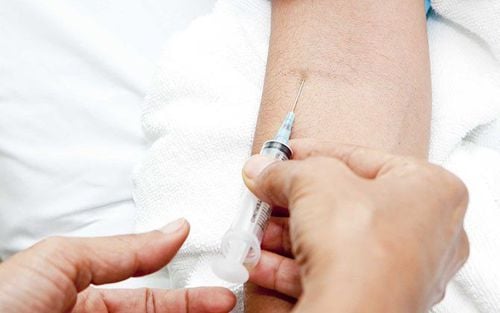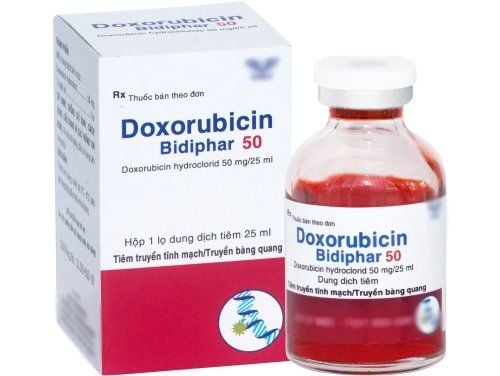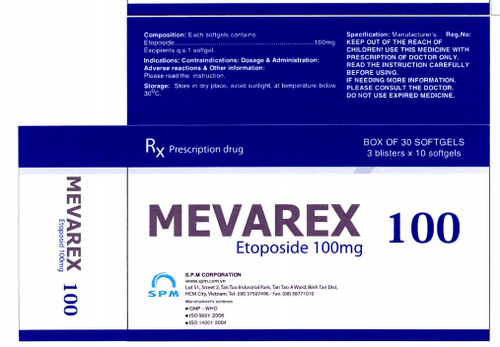This is an automatically translated article.
Ifosfamide is a type used to treat various cancers, such as testicular cancer. Medicines that slow or stop the growth of cancer cells.1. Indications and contraindications of Ifosfamide
Ifosfamide is indicated in the following cases:Primary osteosarcoma Ewing's sarcoma Usually malignant soft-tissue/connective tumor Cancer Burkitt's lymphoma Testicular germ cell tumor Advanced diffuse large B-cell lymphoma Invasive bladder cancer Small cell lung cancer Non-small cell lung cancer Ifosfamide is contraindicated in cases of:
Cancer that has spread to the bones Dehydration Low blood potassium levels Fanconi syndrome, a condition kidneys leading to increased urination, thirst, and vomiting. Anemia Decreased blood platelets Low white blood cell count Confusion Generalized disturbances of peripheral nerves Liver disease Renal tubular acidosis Decreased kidney function Inflammation and bleeding of the bladder due to chemotherapy Coma Bilirubin levels in the blood High Abnormal liver function tests Pregnancy Pregnant women
2. How to use Ifosfamide
Ifosfamide is for intravenous use by medical professionals. Ifosfamide dosage is calculated based on your medical condition, body size and response to treatment. If Ifosfamide touches your skin, immediately wash the area with soap and water. If medicine gets in eyes, open eyelids and rinse with water for 15 minutes, then get medical help right away. To help prevent urinary problems, drink plenty of fluids and urinate often while using Ifosfamide, unless otherwise directed by your doctor. Your doctor may also prescribe other medications (such as mesna, intravenous fluids) to reduce your risk. Tests such as a complete blood count, blood salt/mineral levels, and kidney function should be done while you are using Ifosfamide.
Thuốc Ifosfamide cần được tiêm bởi nhân viên y tế chuyên nghiệp
3. Ifosfamide side effects
While using Ifosfamide, you may experience nausea, vomiting, diarrhea, stomach pain, abdominal pain, loss of appetite, or redness/pain/swelling at the injection site.Nausea and vomiting can be serious. Your doctor may prescribe other medications for you to prevent or reduce nausea and vomiting. Also, eating small meals, eating soft foods, not eating before treatment, avoiding alcohol, or limiting activity can help alleviate some of these side effects. If these side effects persist or get worse, tell your doctor right away.
Rarely severe nausea, vomiting and diarrhea can cause the body to lose too much water. But if you notice any symptoms of dehydration such as a normal decrease in urination, often dry mouth/increased thirst, lack of tears, dizziness/lack of clarity, wrinkled or pale skin, you need to tell your doctor right away. instantly.
You may have pain or sores in your mouth and throat. Brush your teeth gently, carefully, avoid using mouthwash containing alcohol, and gargle regularly with salt water.
During treatment with Ifosfamide, you may experience temporary hair loss. Normal hair growth will return once the treatment is over.
People using Ifosfamide can have serious side effects. However, your doctor has prescribed this medicine because he or she has judged that the benefit to you outweighs the risk of side effects. Careful monitoring by your doctor can reduce the risk of side effects.
Tell your doctor right away if you have any serious side effects of Ifosfamide, including: Numbness/tingling in your hands/feet, signs of heart problems ( such as fast/slow/irregular heartbeat, shortness of breath, swollen ankles/feet, unusual tiredness, unusual/sudden weight gain), change in urine output, vision changes (such as decreased / blurred vision), irregular menstruation / stoppage of menstruation (women).
Get medical help right away if you have any very serious Ifosfamide side effects, including: Convulsions.
A very serious allergic reaction to Ifosfamide is very rare. However, if you notice any of the following symptoms of a serious allergic reaction: Rash, itching/swelling (especially of the face/tongue/throat), severe dizziness, trouble breathing, get medical help. Get medical help right away.
Below are Ifosfamide side effects by likelihood.
Common side effects of Ifosfamide include:
Infection Anemia Low platelet count Low white blood cell count Low neutrophil count Liver damage Bladder inflammation and bleeding Difficult or painful urination Increased need Frequent urination Hair loss Drowsiness Nausea Vomiting Uncommon side effects of Ifosfamide include:
Confusion Kidney damage Fever Phlebitis

Bạn có thể cảm thấy buồn nôn khi dùng thuốc Ifosfamide
Sepsis opportunistic fungal infections Pneumocystis jiroveci pneumonia. Renal Cell Carcinoma Acute Leukemia Thyroid Cancer Disorder due to excess antidiuretic hormone Excess body acidity Decreased body resistance Hemolytic uremic syndrome Significant decrease in bone marrow activity Diffuse intravascular coagulation Very low granulocyte count Methemoglobinemia Drug-induced psychiatric problems Extrapyramidal disease Encephalopathy Toxic effects on the central nervous system Peripheral nerve disorders Nerve toxicity hearing High blood pressure A heart attack A blood clot in the lungs Pericardial effusion Cardiomyopathy Abnormal electrical signals Supraventricular tachycardia Atrial fibrillation Premature ventricular rate Ventricular arrhythmia Supraventricular arrhythmias Failure Chronic cardiac toxicity Cardiac toxicity Vasculitis Capillary leak syndrome Hepatic veno-occlusive disease Blood clots in deep veins of extremities Low blood pressure Interstitial pneumonia Pulmonary fibrosis stomatitis Myelodysplastic syndrome Coma Hallucinations Co convulsions Significant drop in blood pressure due to bacterial infection Shortness of breath Anaphylactic shock Angioedema Cancer malignant lymphoma with complications of the kidney Any type of infection Multiple organ failure Acute myeloid leukemia Excess fibrous tissue covering the heart Increased risk of opportunistic infections Radiation recall syndrome Radiation Tumor lysis syndrome Panic disorder Peripheral neuropathy Blurred vision Red eyes Ringing in the ears Hearing loss Overproduction of saliva Constipation Low sperm count No menstruation Dermatitis Itching Dullness Delirium Loss of memory Lightheadedness Fatigue Chills Temporary flushing of the face and neck Thirst Unintentional leakage of urine Excessive urination Impaired wound healing A feeling of discomfort Severe abdominal pain This is not a complete list of Ifosfamide side effects. If you notice other effects of Ifosfamide not listed above, contact your doctor right away.
4. Measures to prevent side effects of the drug Ifosfamide
Before using ifosfamide, tell your doctor if you are allergic to this medicine and any other allergies, if any. Ifosfamide may contain inactive ingredients, and they may cause allergic reactions or other problems.Before using Ifosfamide, tell your doctor your medical history, especially of: Blood/bleeding problems (such as anemia, low blood cell count), current infections, heart problems (such as fast/irregular heartbeat, heart failure), kidney disease, liver disease, radiation treatment, problems urinating.
Ifosfamide can make you drowsy and alcohol and marijuana can make you drowsy. So you should not drive, use machines, or do anything that requires alertness while using Ifosfamide, until you can do it safely. Limit alcohol and absolutely do not use marijuana during treatment with Ifosfamide.
Ifosfamide may make you more susceptible to infections or may worsen any existing infections. You need to avoid contact with people who have an infection that can spread to others (such as chickenpox, measles, flu). If you have been in contact with someone who has an infection, tell your doctor right away.
Do not vaccinate while using Ifosfamide without your doctor's consent. Also avoid contact with people who have recently received a live attenuated vaccine.

Trong quá trình dùng thuốc Ifosfamide không nên tiêm chủng
Rarely, people treated with Ifosfamide have developed other cancers (such as leukemia).
Before surgery, tell your doctor or dentist that you are being treated with Ifosfamide.
Tell your doctor if you are pregnant or plan to become pregnant before using Ifosfamide. You should not become pregnant while using ifosfamide, because it can harm an unborn baby. Women who are using this medicine should ask about reliable forms of birth control.
Ifosfamide can also affect sperm production, increasing the risk of having a baby with birth defects. So men with female partners of childbearing age should ask about reliable forms of birth control (such as condoms) while using this medicine and for up to 6 months after stopping treatment. treat.
Ifosfamide passes into breast milk and may have unwanted effects on a newborn baby. Breast-feeding while using this medicine is not recommended.
5. Ifosfamide drug interactions
Drug interactions can change the way ifosfamide works or increase your risk of serious side effects. Tell your doctor about all the medicines you use. Do not start, stop, or change the dose of any medicine while being treated with Ifosfamide, without your doctor's approval.Products that may interact with Ifosfamide are: Nalidixic acid.
6. What to do if you overdose or forget to use Ifosfamide?
If you or someone else has overdosed on Ifosfamide and has serious symptoms such as fainting or difficulty breathing, tell your doctor right away.For the best possible benefit, it is important to receive each dose of Ifosfamide on the schedule directed by your doctor. If you miss a dose, contact your doctor to set up a new Ifosfamide dosing schedule.
Please dial HOTLINE for more information or register for an appointment HERE. Download MyVinmec app to make appointments faster and to manage your bookings easily.
Reference source: webmd.com












